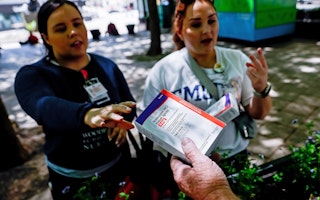HIV and Drug Users: We Need Better Policy, Less Policing
By Kasia Malinowska-Sempruch
Thousands of AIDS activists, scientists, and policy makers gathered in Vienna recently for the 18th International AIDS Conference. Having been involved in AIDS advocacy and research for close to two decades, I continue to be inspired and touched by the enthusiasm of so many at the conference.
When we first turned attention to AIDS, the principal focus was to understand the disease. Drug users were invisible. Today, 6.6 million drug users are HIV-positive. In some regions HIV prevalence can be as high as 70 to 80 percent among people who inject drugs.
Far too often, drug policies at the national and international level continue to limit drug users' access to vital HIV prevention and treatment programs.
According to the most recent issue of the medical journal The Lancet, only 5 percent of drug users have access to sterile needle and syringe programs and only 8 percent receive opiate substitution therapy to treat drug dependence. Even worse, only 4 percent of injecting drug users receive antiretroviral therapy.
The Lancet issue not only describes the problem but also offers solutions. If the world community is serious about effective HIV prevention, evidence-informed policies such as decriminalization of personal possession must be embraced. Governments can no longer allow misguided criminal justice policies to stand in the way of public health.
We leave the conference with the Vienna Declaration, which calls on governments to incorporate scientific, evidence-based approaches to halting the spread of HIV among injecting drug users.
To date over 13,000 individuals have signed the declaration, including Fernando Henrique Cardoso, former President of Brazil Ernesto Zedillo, former President of Mexico César Gaviria, former President of Colombia Françoise Barré-Sinoussi, Nobel laureate and discoverer of the HIV virus Dr. Michel Kazatchkine.
We need governments to follow suit and commit to provide needle exchange programs, opioid substitution treatment, and antiretroviral therapies—model projections by Lancet show that combining the three interventions and offering them widely can reduce infection rates by more than 50 percent. Decriminalizing personal possession is also key.
Collectively, we need to send a clear message that we can no longer continue to police a public health problem. Getting our city halls, public health offices, police departments, judges, and governments to sign the Vienna Declaration is a good first step.

Kasia Malinowska-Sempruch is a director of Programs at the Open Society Foundations.


